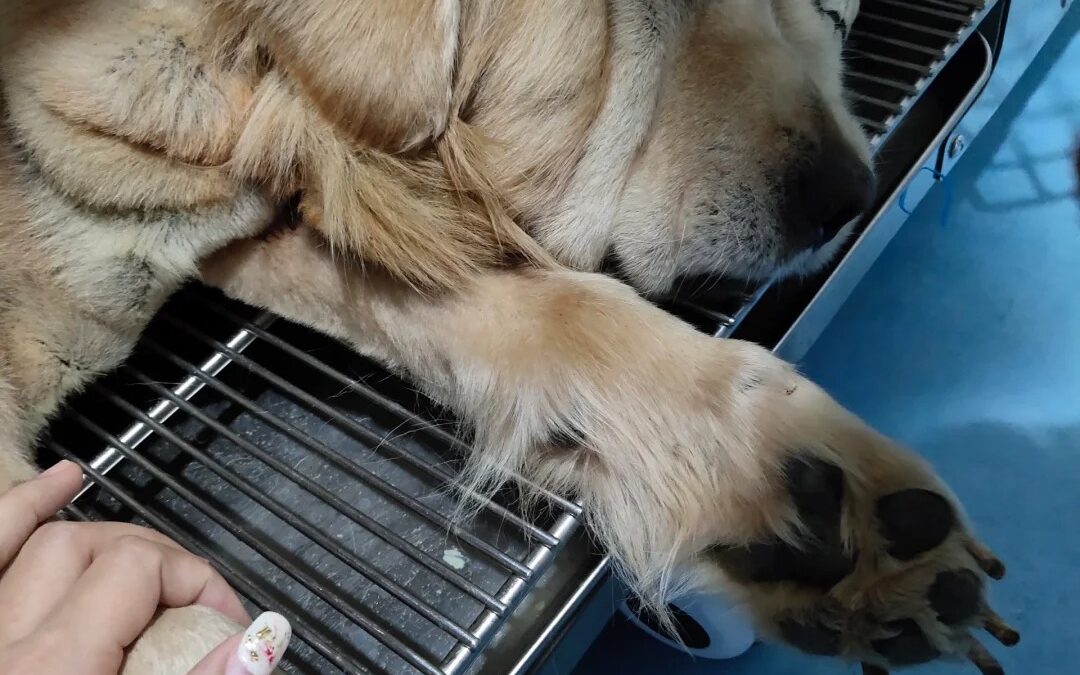-1000x675.jpg)
by TCMVET | Apr 18, 2024 | Food & Health
Recovery from surgery or illness can be a challenging time for pets. TCMVET Baituxiao supports recovery by promoting better circulation, reducing inflammation, and enhancing energy levels through its carefully selected herbs. These properties not only help in the physical recovery process but also improve your pet’s overall well-being, making them feel more comfortable and energetic as they heal.

by TCMVET | Mar 25, 2024 | pet Chinese herbal medicine
At TCMVET, our mission is simple yet profound: to enhance the health and vitality of companion animals through the power of traditional Chinese herbal supplements. With a deep-rooted belief in the efficacy of ancient remedies, we are committed to crafting premium-quality products that harness the inherent healing properties of nature.
Rooted in History, Grounded in Science
Traditional Chinese Veterinary Medicine (TCVM) boasts a rich legacy dating back over two millennia, tracing its origins to the ancient period of Fuxi in China. It began as a humble practice, with simple herbal remedies used to treat the ailments of domesticated animals. Today, TCVM stands as a comprehensive system of animal healthcare, blending time-honored traditions with modern research insights.
Our Commitment to Quality
At TCMVET, quality is non-negotiable. We meticulously source our herbal ingredients from the pristine landscapes of China, ensuring that each plant meets rigorous standards of authenticity and purity. From origin and variety to wildness and cultivation, every aspect of our herbs is scrutinized to guarantee unmatched quality and efficacy.
Harnessing the Power of Nature
Our herbal supplements serve as powerful allies in promoting pet wellness, offering natural solutions to a wide range of health concerns. Whether used as complementary therapy alongside conventional treatments or as standalone remedies, Chinese herbs provide holistic support for pets facing complex health challenges.
Safe and Sustainable Solutions
With a legacy of safety spanning thousands of years, Chinese herbs offer a gentle yet effective approach to pet care. Unlike synthetic medications, our herbal supplements boast minimal to no side effects, making them suitable for long-term use without compromising on safety or efficacy.
At TCMVET, we invite you to embark on a journey towards optimal pet health and vitality. With our premium-quality herbal supplements, backed by centuries of wisdom and modern scientific insights, you can provide your furry companions with the care they deserve – naturally and holistically.

by TCMVET | Mar 25, 2024 | Dog Cancer & Tumors
In the realm of pet care, few things are as distressing as witnessing our beloved companions battle against illness, especially when it comes to formidable foes like tumors. Yet, amidst such challenges, there shines a beacon of hope: TCMVET Baituxiao.
A Story of Struggle and Hope Imagine the plight of a helpless dog, writhing in pain, collapsing under the weight of a massive tumor, and crying out in desperate agony. This poignant image encapsulates the harsh reality faced by many pets and their owners. However, within this darkness lies a glimmer of hope – the potential for relief and healing through the innovative approach of TCMVET Baituxiao.
Understanding TCMVET Baituxiao: A Holistic Solution TCMVET Baituxiao represents a paradigm shift in pet healthcare, drawing upon the rich heritage of Traditional Chinese Medicine (TCM) to offer a holistic solution to various health challenges, including tumors. At its core, Baituxiao aims to restore balance and harmony within the body, bolstering the immune system, reducing inflammation, and potentially aiding in tumor management.
Case Study: A Compelling Journey of Healing Consider the case of a courageous dog facing a life-threatening tumor. Despite the odds stacked against them, the introduction of TCMVET Baituxiao into their treatment regimen marked a turning point in their journey. With diligent care and the support of Baituxiao’s unique blend of herbal remedies, the dog experienced a remarkable improvement in their condition. Gradually, the once agonizing cries were replaced by signs of comfort and vitality, offering a glimmer of hope to their devoted owner.
The Power of Integration: Complementing Conventional Treatment It’s essential to highlight that TCMVET Baituxiao is not a standalone solution but rather a complementary approach to conventional veterinary care. Before embarking on any new supplement or treatment, consulting with a trusted veterinarian is paramount. By integrating Baituxiao into a comprehensive treatment plan, pet owners can harness the collective benefits of both Eastern and Western medicine, maximizing the potential for their pet’s well-being.
Empowering Pet Owners: A Call to Action In conclusion, the journey of pet care is often fraught with challenges, yet it is also filled with moments of profound resilience and hope. TCMVET Baituxiao stands as a testament to the enduring bond between humans and animals, offering a beacon of healing and relief in the face of adversity. As responsible pet owners, let us embrace this opportunity to explore holistic avenues of care and empower our furry companions to live their best lives.
With TCMVET Baituxiao, the path to healing begins anew, promising a brighter and healthier future for our beloved pets.

by TCMVET | Mar 24, 2024 | pet Chinese herbal medicine
The world of canine oncology is undergoing a transformative phase with the integration of Ancient Chinese herbs into treatment regimens. This approach signifies a blend of traditional wisdom and modern veterinary practices, offering a new hope in the fight against cancer in dogs.
The Rise of Herbal Medicine in Canine Oncology
Herbal medicine, especially from Ancient Chinese traditions, has been used for millennia to treat various ailments. Its introduction into canine oncology is a result of increasing demand for holistic and less invasive treatment options for dogs with cancer.
Ancient Chinese Herbs and Their Impact
- Yunnan Baiyao: Used historically to control bleeding, it’s now employed in managing tumors that cause internal hemorrhage.
- Huang Qin (Scutellaria): Known for its anti-inflammatory and anti-tumor effects, it’s beneficial in mitigating side effects of conventional cancer therapies.
- Astragalus (Huang Qi): Boosts the immune system and is believed to inhibit tumor growth.
- Dang Gui (Angelica Sinensis): Often used for its blood-enriching properties and improving circulation.
Integrating Traditional Herbs with Modern Veterinary Science
The incorporation of these herbs into a dog’s cancer treatment plan should be a collaborative effort between pet owners and veterinarians. This integration ensures that the herbs complement rather than counteract conventional treatments.
Benefits of Using Ancient Chinese Herbs in Canine Cancer
- Holistic Treatment: Addresses not just the cancer but the overall well-being of the dog.
- Reduced Side Effects: Offers a natural way to mitigate the adverse effects of chemotherapy and radiation.
- Boosts Immunity: Many herbs have properties that strengthen the immune system, helping the body fight cancer more effectively.
Safety and Efficacy
While generally safe, the quality and dosage of these herbs are crucial. They must be sourced from reputable suppliers and administered under veterinary guidance to avoid interactions with other medications.
The use of Ancient Chinese herbs in canine oncology represents a groundbreaking shift towards more holistic cancer care. By integrating these age-old remedies with contemporary treatment methods, we can offer our canine companions a more comprehensive and gentle approach to cancer treatment.

by TCMVET | Mar 24, 2024 | pet Chinese herbal medicine
The fight against canine cancer is an ongoing battle for many pet owners. While conventional medical treatments like surgery, chemotherapy, and radiation therapy play a significant role, there’s a growing interest in integrating herbal therapy as a complementary approach. This article delves into how herbal therapy can be incorporated effectively in the treatment regimen for dogs with cancer, emphasizing its benefits and practical applications.
Understanding Canine Cancer
Cancer in dogs, like in humans, is a complex and multifaceted disease. It can manifest in various forms, affecting different breeds and ages. Early detection is crucial, as it can significantly increase the chances of successful treatment.
The Role of Herbal Therapy in Canine Cancer Treatment
Herbal therapy in dogs with cancer is not about replacing conventional treatments but complementing them. These natural remedies are used to support the dog’s overall health, mitigate side effects of conventional treatments, and potentially slow the progression of cancer.
Key Herbs Used in Canine Cancer Treatment
- Turmeric (Curcumin): Its anti-inflammatory and antioxidant properties can help in reducing tumor size and alleviating pain.
- Milk Thistle: Known for liver support, it can detoxify the body, especially after chemotherapy.
- Cannabis (CBD): Used for pain relief and reducing inflammation, CBD can improve the quality of life for dogs undergoing cancer treatment.
- Astragalus: Boosts the immune system and is believed to inhibit tumor growth.
- Ginger: Helps in managing nausea and digestive issues associated with cancer treatments.
Integrating Herbal Remedies with Conventional Treatments
It’s important to collaborate with a veterinarian who understands both herbal and conventional medicine. They can guide the appropriate use of herbal supplements, ensuring they don’t interfere with standard cancer treatments.
Benefits of Integrating Herbal Therapy
- Alleviates Side Effects: Herbal therapies can reduce side effects associated with chemotherapy and radiation.
- Boosts Overall Well-being: These herbs often contribute to better overall health, improving energy levels and appetite.
- Supports Immune System: A stronger immune system can help the body fight cancer more effectively.
Considerations and Safety
Quality and correct dosing of herbal products are crucial. It’s important to source these remedies from reputable suppliers and observe the dog for any adverse reactions.
Integrating herbal therapy into the cancer treatment plan for dogs offers a holistic approach, aligning with the growing demand for natural and less invasive treatment methods. This strategy can potentially improve the quality of life and overall health of dogs battling cancer.
-1000x675.jpg)




